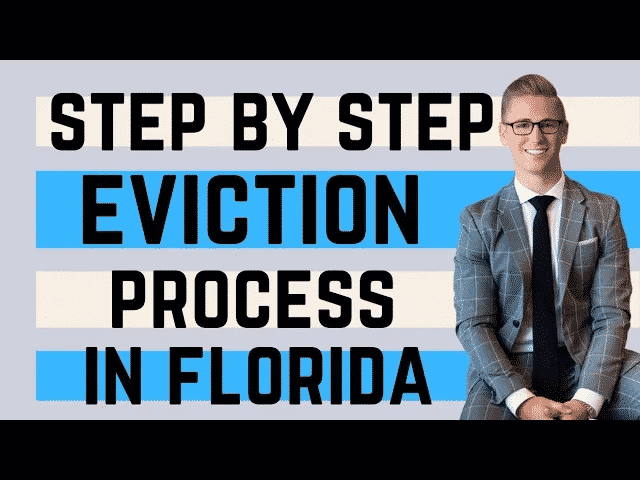Are you a self-managing landlord that has a bad tenant? Is it the 10th of the month and still no rent? Do you get excuse after excuse from your tenant as to why their rent is late? Well, you’re not alone, these are common scenarios that landlords often face in Florida. When you give an inch, they’ll take a mile. As a self-managing landlord, the thought of eviction can seem like a daunting task. If done incorrectly, an eviction in Florida can be a time-consuming and costly event. This blog topic will teach you step-by-step what an eviction entails here in Florida. At The Listing Real Estate Management, we are a full-service Orlando property management company and serve as a resource to you and your rental property.
Why Evict?
Most evictions in Florida are going to be grouped into two categories; non-payment of rent and tenant breach of contract. As a seasoned property management company in Orlando Florida, we have seen that those two reasons are the most popular among evictions in Florida. If the reason you are evicting your tenant in Florida does not fall into these two categories, the best course of action would be your standard Notice of Non-renewal. This will depend on the lease term. If your tenant has been a pain for the last 10 months, we recommend putting up with them for the remaining two months and letting them go at their lease expiration date. You may regret renting to your current tenants, but rather than going through the headache of eviction, we would suggest just wait it out until their lease ends. Wash your hands of your trouble tenants and hire a professional property management company.
Eviction Warning Letter
Many times, you can send your tenant a letter informing them that you will evict them if they do not pay rent, or resolve the compliance issue. It can sometimes be much easier to resolve issues outside of the court system. We have found this warning to be extremely successful. Typically, if your tenant did not pay rent, you serve your 3 Day Notice to Pay or Quit. Once this notice is posted your tenant usually tries to reach out to you. Sometimes it is in your best interest to let your tenant know the lease agreement terms and warn them if they do not abide by the lease.
Florida 3 Day Notice to Pay Rent or Quit
Proper notices according to “Chapter 83” Florida Statutes allows you to post a 3 Day Notice to Pay Rent or Quit. This is the notice that needs to be posted (according to your lease agreement.) The laws according to Florida Statutes affect any rental property that is considered long term, anything over 6 months and one day. When your tenant does not pay rent during the time-frame stated in your lease agreement, you will post your 3 Day Notice. Once the 3 Day Notice to Pay Rent or Quit is posted your tenant has three business days (not including weekends and holidays) to deliver rent. If your tenant does not deliver rent before the last day stated on your 3 Day Notice, then it is critical you do not accept rent after that if you wish to pursue the eviction.
7 Day Notice to Cure
You drove by your rental property doing your quarterly drive-by and noticed a dog running around the property and three adults living on the premises. As the landlord, you boil with anger knowing that your lease states no pets and no unauthorized occupants. Both of which you know are in breach of their lease agreement. You will need to serve your 7 Day Notice to Cure. Your 7 Day Notice to Cure is when your tenant is in breach of their contract or not following the terms of your agreement. You must give your tenant 7 calendar days to correct the violation. If your tenant refuses to correct the violation, then you will need to continue to eviction and consult your attorney. Again, if your tenant has a month left in their lease agreement, we recommend to rid yourself of the trouble tenants by giving your notice of nonrenewal. If your tenant is on a month to month lease agreement then the next section is for you.
15 Day Notice
Terminating a month to month lease agreement according to Chapter 83, Florida Statutes, landlord or tenant can give their 15 Day Notice to Vacate. Month to month lease agreements are not recommended due to the short notice landlord or tenant can give. It can benefit a Florida landlord if the tenant is being troublesome, serve your 15 Day Notice. As a professional property management company in Orlando, we recommend to never agree to a month to month tenancy or carry over your 12-month lease into a month to month option.
Now that we understand the proper legal notices served in accordance with Chapter 83 Florida Statutes. Below is the step by step eviction process in Florida:
Steps to Eviction:
Step 1. Deliver/post the notice which applies to your situation (Non-payment or Breach of Lease Agreement)
Step 2. File the Eviction: Evictions are filed at the courthouse in the county where the property is located
Step 3. Court serves a summons
Once the tenant is served, the tenant has 5 calendar days to file a response. If a response is filed from the tenant, the owner will be notified of a pending court date and the landlord/owner (or their attorney) will need to appear in court.
If the tenant does not file a response, in the case of a 3 Day Notice, the case gets forwarded to finalized.
Step 4. Final Judgment is issued
Step 5. WRIT of possession
- This is the final documentation through the court system
- Always follow through with the WRIT, even if the tenant appears to have vacated
Step 6. Sheriff serves WRIT
- The 24-hour notice gets posted from the Sheriff
- After the 24 hour notice period, the sheriff inspects the property and turns it back over to the landlord/eviction contact person
Tenant Hasn’t Vacated?
What happens if the tenant did not vacate when the sheriff arrives to turn over the property? The sheriff will ask them verbally to leave the premises, if they won’t leave, the sheriff will physically remove them.
After the Eviction:
You have finally evicted your trouble tenant. After 45 days or longer, your property is vacant. Steps to finish up the process.
Step 1. Inspect the property
Step 2. Change the Locks
Step 3. Determine the security deposit claim monies and send the claim notice via certified mail to the tenant’s last known mailing address.
Final Thoughts
The eviction process consists of many steps, and of course, no homeowner or real estate investor enjoys going through eviction. Evictions in Florida can be quick and cheap or if contested can take a long time and be very costly. You can significantly reduce or eliminate evictions if you have a professional property management company in Florida. At The Listing Real Estate Management, we guarantee our tenants that we place and ensure peace of mind that you’ll receive your rental payments. If you have any questions about the eviction process or are in need of an Orlando property manager, contact us at The Listing Real Estate Management.
*Please note, we highly recommend consulting an attorney for eviction consulting and advice.




